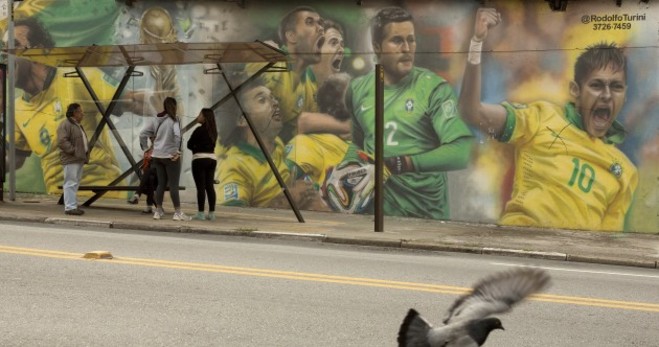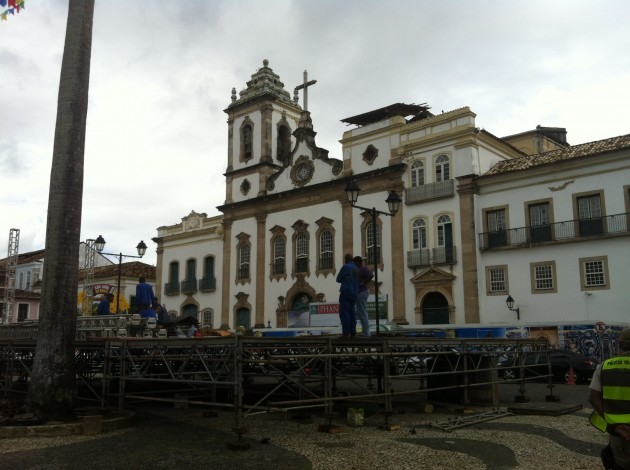IMAGINE DUNDRUM TOWN centre on an exceptionally busy Saturday before Christmas and you have some idea of the crowds thronging around Salvador’s gargantuan Iguatemi Shopping Centre.
The ground floor of the mall where fans are now arriving to collect their World Cup match tickets is jammed with hordes of teenagers and families enjoying some Sunday afternoon shopping.
Like much of Brazil what confronts you is a mess of people in which it would be all too easy to lose yourself and yet, there he is, as always, stalking me. Silently standing over me in his underpants.
I turn suddenly to see Neymar’s boyish, handsome, sort-of-but-not-totally-stubbly visage smiling at me from the window of an underwear shop. Across the concourse he takes pride of place in a phone shop, while his advertisements for football boots, headphones and glasses are all prominent in shop windows.
After an indifferent first season in Spain, when his convoluted contract and signing-on fee made more headlines than his performances on the field, Neymar was criticised in some quarters for repeatedly brandishing this brand of underwear during Barcelona’s Champions League quarter-final loss to Atletico Madrid.
That was Europe and this is the World Cup in Brazil. You get the sense the 22-year-old could wear his jocks on his head against Croatia and by Friday morning this new form of hat would be the craze sweeping the fifth largest nation in the world.
Neymar, an advertiser’s dream, could have helped Willy Loman sell ice to eskimos and right now it is the modern day Don Drapers who seems to be most enthusiastically supporting World Cup 2014.
On arrival in Rio’s Galeao International Airport last Tuesday there was little discernible evidence that the globe’s biggest sporting event was on the cusp of occurring. One sad little corrugated cardboard booth, unmanned at 9pm at night, and a few FIFA-branded signs pointing to the Maracana, via the taxi booths.
Our taxi driver was listening to Vasco da Gama’s 2-0 win over Boa EC as he hurtled towards Copacabana but seemed relatively indifferent to the World Cup looming on the horizon. Bar owners stringing up bunting and the odd Brazil flag jutting from an apartment window were indications the tournament was being anticipated, but it was on billboards and bus stops where the FIFA jamboree was being most enthusiastically welcomed.
https://vine.co/v/MDUEAaJxu0X
Shrek, Donkey and the rest of the cartoon franchise’s cast gurned in credit card advertisements, while soft drinks, beers, banks, airlines and every business in between proclaimed the arrival of the World Cup.
Some of FIFA’s longest-standing sponsors may have warned the football organisation in the wake of the Sunday Times’ Qatar revelations but the 2014 marketing strategies will not be dampened because there are strong suggestions the World Cup eight years from now may have been secured by nefarious means.
Besides there are more immediate concerns for organisers and those with a vested interest in the tournament. The protests and metro strikes in São Paulo have made headlines around the world but here in Salvador, Brazil’s third largest city, there is also disquiet.
Locals expect the city’s hosting of six matches — starting with Friday’s rematch of the 2010 final between Spain and Holland — to be disrupted by protests. Suspicions of corruption at local government level, failing infrastructure and health service concerns have brought the people of Salvador on to the streets already, with violent consequences, and there are expected to be more this month.
We got a small and peaceful taster on Friday when fishermen picketed the municipal building. Not all unhappiness in Brazil is a result of the World Cup, but there is much unhappiness. Pew Research this month estimated 72% of Brazilians are dissatisfied with the state of their country, while 61% believe hosting the World Cup is a bad thing to be doing with the economy is under strain.
The hawkers, restaurateurs and bar owners are unlikely to have much to protest about for the next four weeks but even the publicans are managing to keep their World Cup fever in check. Strolling around Salvador’s historic Pelourinho district on Saturday night it was impossible to find a taverna showing England and Honduras. All accounts of that hackfest in Miami suggest the shrewd victuallers of this city did me a good turn.
As the fanzone in Terreiro de Jesus is slowly erected for the Dutch and Spanish fans arriving in dribs and drabs the most visible indicators a World Cup is imminent are still the salesmen and women at their stalls on Avenue Jose Joaquim Seabra.
While an official FIFA World Cup 2014 polo shirt will set you back R$130 (€43) in Galeao Airport, reasonable knock-off Brazil jerseys are being flogged for R$10 on this street of market stalls. There are no prizes for guessing whose name and the number 10 adorns the back of practically every one of them.
From the air-conditioned halls of Iguatemi to the sandy pavements of Avenue Jose Joaquim Seabra there is no avoiding Neymar. The sort-of-but-not-totally-stubbly face of the World Cup.


